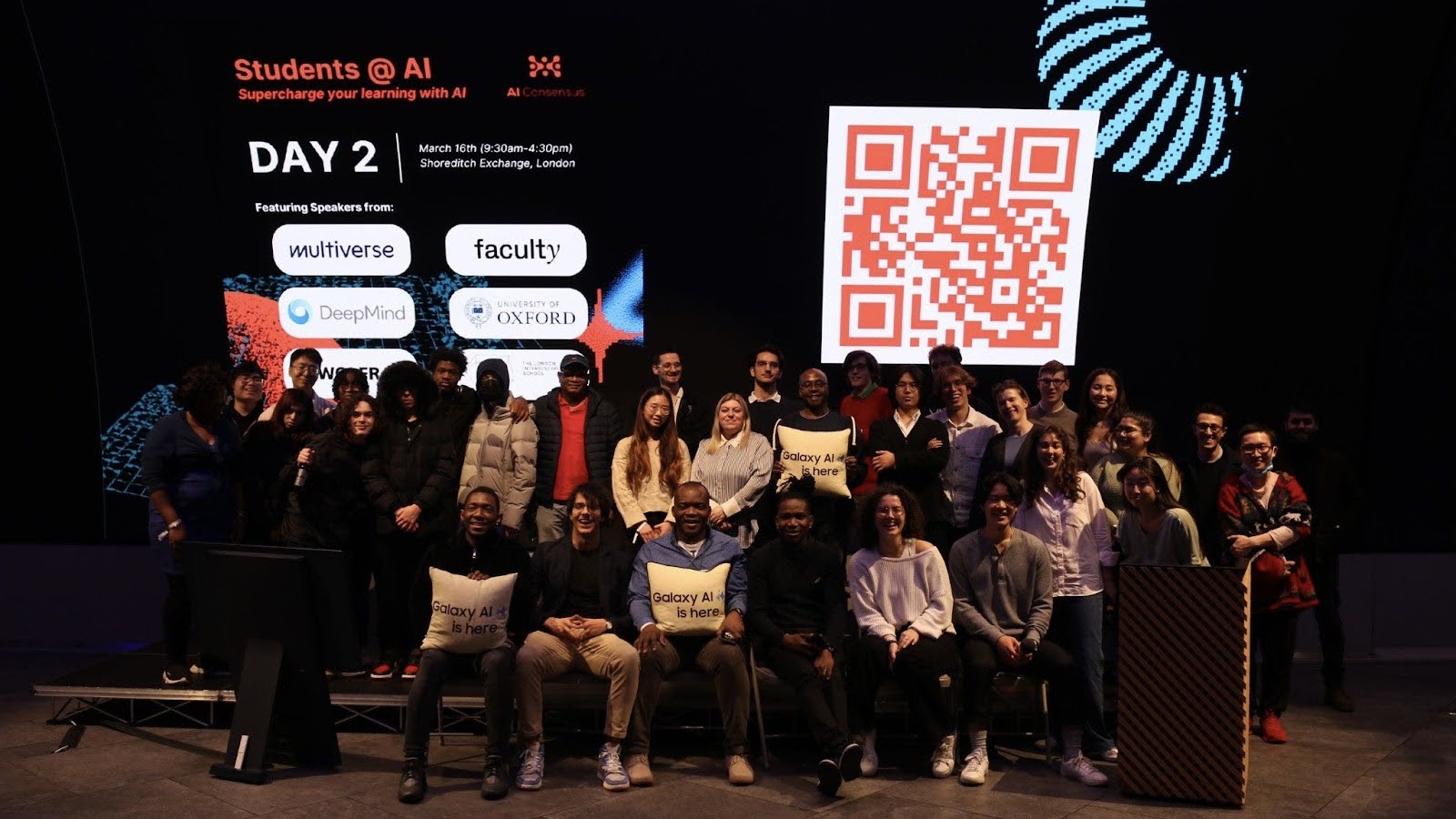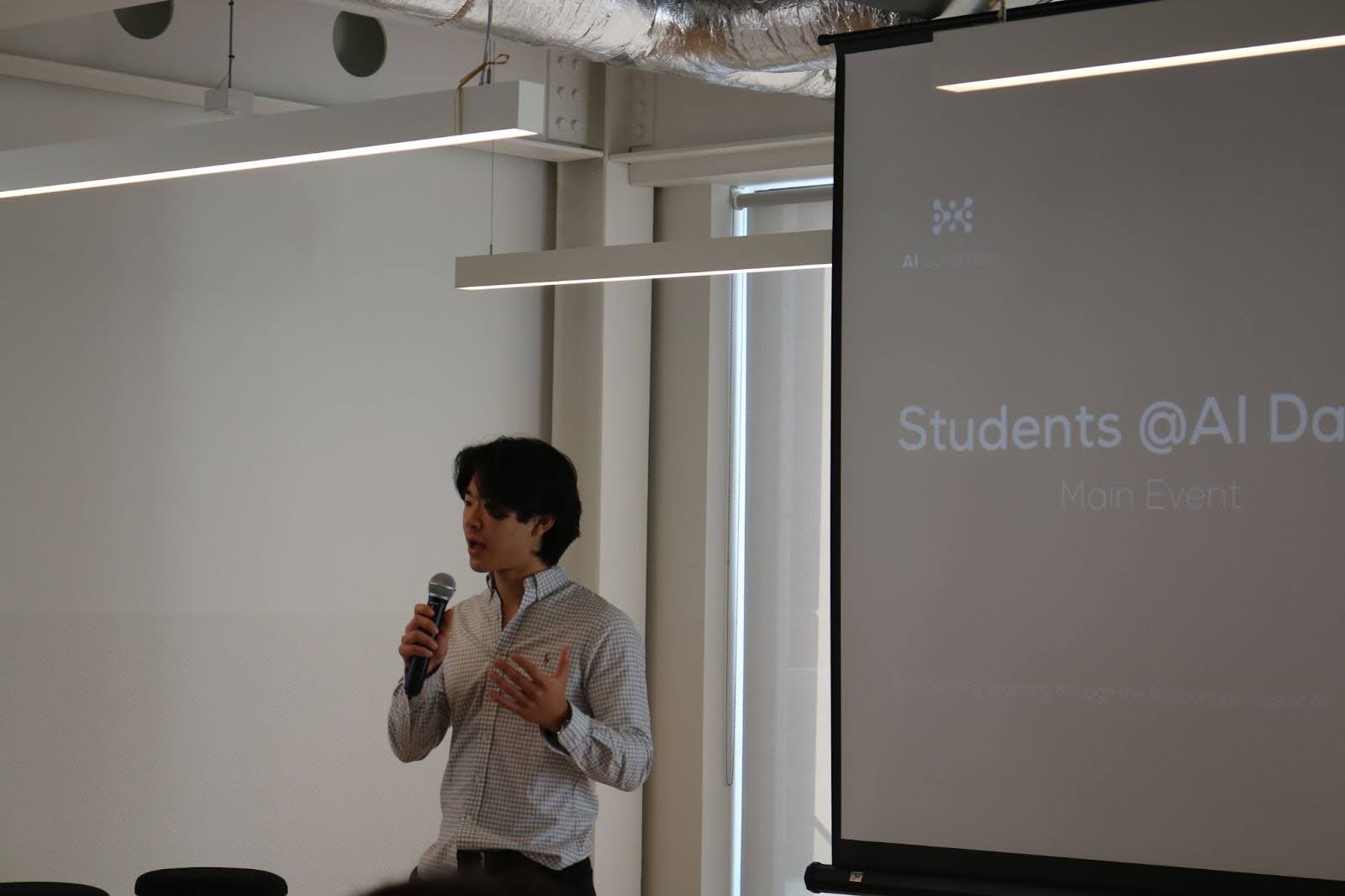
We at AI Consensus, a Minerva student-led initiative, recently hosted Students@AI in London between March 15-16, 2024. The event brought together 200+ students, educators, and stakeholders in education, with the ultimate goal of exploring how we can best use AI to learn and how the experience of students fundamentally changes with this new technology.
Over the past year, we’ve been highly optimistic about the role that AI can play in enhancing the learning of students and education as a whole. At Minerva and throughout the world, we’ve seen brilliant efforts by individuals and organizations, grappling with AI’s benefits and challenges, and working to responsibly integrate AI into the learning experience.
However, it’s also been clear to us that many elements of this puzzle haven’t been properly explored, especially as AI itself continues to progress. Through this event, we sought to address two of these critical and connected gaps.

First, most conversations around AI are dominated by teachers and administrators. Yet, the perspective of students, who use AI the most and are the most affected by policies around AI, is rarely involved. This not only means that much useful insight is lost but also leads to policies that might be misguided.
Second, and partially due to the lack of students in discussions, most current efforts we have found are focused on theoretical frameworks, such as AI policies for schools and classrooms, or discussing the long-term impacts of the technology. What is missing is a discussion about the actionable steps that students can take to make the most out of AI, and to prepare themselves for a future with AI.

Students@AI kicked off on March 15 with a Pitch Contest Night in Samsung KX, where teams battled it out, brainstorming use cases for AI for a prize. After three rounds of pitching, with other teams presenting challenges, the team that took the prize presented a platform that enhances learning by helping learners find follow-up questions and threads to explore.
On the March 16, we started with a workshop by researchers at Google DeepMind, exploring using generative AI as a tutor. Participants shared about their current experiences with using AI, what their pain points are, and got to demo a Youtube-integrated tutor.

Next, we had the AI-Ready workshops, where participants got to engage with professionals from organizations like Wolfram, Trusted Doctor, Builder.AI, and Sage Publishing. Within small groups, students got to explore the applications of AI in specific sectors and talk with professionals within those fields.
Students@AI wouldn’t be the same without panels, exploring themes such as the future of work with AI, how AI is transforming the focus of learning, and whether AI is going to make great ideas harder to find. We featured a wide variety of panelists, including educators, such as our own Professor Geneva Stein, AI company leaders, like Angie Ma from Faculty.AI, entrepreneurs, like Chris Yeh who wrote Blitzscalling, school administrators, like Marcin Szala who founded Liceum Artes Liberales, and of course, students.

Ultimately, this event was focused on student involvement, ensuring that participants had the opportunities to speak up, interact... actually participate! If there is one thing that is clear after hosting this event, it is the importance of conversing with diverse stakeholders. Ensuring that students, educators, and administrators are all given chances to express their unique opinions and perspectives. We can only figure out so much ourselves, but collectively, the possibilities expand exponentially.
If you are a student, we urge you to speak up, talk to your peers, talk to your teachers, talk to the moon. If you are not a student, engage with them, involve them, learn from them. We hope many interesting discussions will ensue.
About AI Consensus
Founded on the principles of collaboration, innovation, and responsibility, AI Consensus is a Minerva University student organization that aims to establish a global platform for discussions around AI in education, advocating for embracing its use in education and integrating it responsibly into educational settings.
AI Consensus is sponsored by the Responsible Technology Youth Power Fund, including organizations such as the Omidyar Network and the Archwell Foundation.
Quick Facts
Social Sciences & Business
Business & Computational Sciences
Business and Social Sciences
Social Sciences and Business
Computational Sciences & Social Sciences
Computer Science & Arts and Humanities
Business and Computational Sciences
Business and Social Sciences
Natural Sciences
Arts and Humanities
Business, Social Sciences
Business & Arts and Humanities
Computational Sciences
Natural Sciences, Computer Science
Computational Sciences
Arts & Humanities
Computational Sciences, Social Sciences
Computational Sciences
Computational Sciences
Natural Sciences, Social Sciences
Social Sciences, Natural Sciences
Data Science, Statistics
Computational Sciences
Business
Computational Sciences, Data Science
Social Sciences
Natural Sciences
Business, Natural Sciences
Business, Social Sciences
Computational Sciences
Arts & Humanities, Social Sciences
Social Sciences
Computational Sciences, Natural Sciences
Natural Sciences
Computational Sciences, Social Sciences
Business, Social Sciences
Computational Sciences
Natural Sciences, Social Sciences
Social Sciences
Arts & Humanities, Social Sciences
Arts & Humanities, Social Science
Social Sciences, Business
Arts & Humanities
Computational Sciences, Social Science
Natural Sciences, Computer Science
Computational Science, Statistic Natural Sciences
Business & Social Sciences
Computational Science, Social Sciences
Social Sciences and Business
Business
Arts and Humanities
Computational Sciences
Social Sciences
Social Sciences and Computational Sciences
Social Sciences & Computational Sciences
Social Sciences & Arts and Humanities
Computational Science
Computational Science & Business
Economics
Social Sciences
Applied Problem Solving & Computer Science and Artificial Intelligence
Computer Science and Artificial Intelligence & Cognition, Brain, and Behavior
Designing Societies & New Ventures
Strategic Finance & Data Science and Statistics
Brand Management and Designing Societies
Data Science & Economics
Machine Learning
Cells, Organisms, Data Science, Statistics
Arts & Literature and Historical Forces
Artificial Intelligence & Computer Science
Cells and Organisms, Mind and Emotion
Economics, Physics
Managing Operational Complexity and Strategic Finance
Global Development Studies and Brain, Cognition, and Behavior
Scalable Growth, Designing Societies
Business
Drug Discovery Research, Designing and Implementing Policies
Historical Forces, Cognition, Brain, and Behavior
Artificial Intelligence, Psychology
Designing Solutions, Data Science and Statistics
Data Science and Statistic, Theoretical Foundations of Natural Science
Strategic Finance, Politics, Government, and Society
Data Analysis, Cognition
Brand Management
Data Science and Statistics & Economics
Cognitive Science & Economics
Data Science and Statistics and Contemporary Knowledge Discovery
Conversation
We at AI Consensus, a Minerva student-led initiative, recently hosted Students@AI in London between March 15-16, 2024. The event brought together 200+ students, educators, and stakeholders in education, with the ultimate goal of exploring how we can best use AI to learn and how the experience of students fundamentally changes with this new technology.
Over the past year, we’ve been highly optimistic about the role that AI can play in enhancing the learning of students and education as a whole. At Minerva and throughout the world, we’ve seen brilliant efforts by individuals and organizations, grappling with AI’s benefits and challenges, and working to responsibly integrate AI into the learning experience.
However, it’s also been clear to us that many elements of this puzzle haven’t been properly explored, especially as AI itself continues to progress. Through this event, we sought to address two of these critical and connected gaps.

First, most conversations around AI are dominated by teachers and administrators. Yet, the perspective of students, who use AI the most and are the most affected by policies around AI, is rarely involved. This not only means that much useful insight is lost but also leads to policies that might be misguided.
Second, and partially due to the lack of students in discussions, most current efforts we have found are focused on theoretical frameworks, such as AI policies for schools and classrooms, or discussing the long-term impacts of the technology. What is missing is a discussion about the actionable steps that students can take to make the most out of AI, and to prepare themselves for a future with AI.

Students@AI kicked off on March 15 with a Pitch Contest Night in Samsung KX, where teams battled it out, brainstorming use cases for AI for a prize. After three rounds of pitching, with other teams presenting challenges, the team that took the prize presented a platform that enhances learning by helping learners find follow-up questions and threads to explore.
On the March 16, we started with a workshop by researchers at Google DeepMind, exploring using generative AI as a tutor. Participants shared about their current experiences with using AI, what their pain points are, and got to demo a Youtube-integrated tutor.

Next, we had the AI-Ready workshops, where participants got to engage with professionals from organizations like Wolfram, Trusted Doctor, Builder.AI, and Sage Publishing. Within small groups, students got to explore the applications of AI in specific sectors and talk with professionals within those fields.
Students@AI wouldn’t be the same without panels, exploring themes such as the future of work with AI, how AI is transforming the focus of learning, and whether AI is going to make great ideas harder to find. We featured a wide variety of panelists, including educators, such as our own Professor Geneva Stein, AI company leaders, like Angie Ma from Faculty.AI, entrepreneurs, like Chris Yeh who wrote Blitzscalling, school administrators, like Marcin Szala who founded Liceum Artes Liberales, and of course, students.

Ultimately, this event was focused on student involvement, ensuring that participants had the opportunities to speak up, interact... actually participate! If there is one thing that is clear after hosting this event, it is the importance of conversing with diverse stakeholders. Ensuring that students, educators, and administrators are all given chances to express their unique opinions and perspectives. We can only figure out so much ourselves, but collectively, the possibilities expand exponentially.
If you are a student, we urge you to speak up, talk to your peers, talk to your teachers, talk to the moon. If you are not a student, engage with them, involve them, learn from them. We hope many interesting discussions will ensue.
About AI Consensus
Founded on the principles of collaboration, innovation, and responsibility, AI Consensus is a Minerva University student organization that aims to establish a global platform for discussions around AI in education, advocating for embracing its use in education and integrating it responsibly into educational settings.
AI Consensus is sponsored by the Responsible Technology Youth Power Fund, including organizations such as the Omidyar Network and the Archwell Foundation.